
The Institute of Bioengineering and Nanotechnology (IBN) of the Agency for Science, Technology and Research (A*STAR), Singapore, and IBM Research have developed a synthetic molecule that can kill five types of deadly drug-resistant superbugs with limited side effects.
The international research team’s new material could be developed into an antimicrobial drug to treat patients with drug-resistant superbugs.
Superbugs’ resistance to antibiotics is a serious health threat, killing around 700,000 people worldwide every year, according to the UK Review on Antimicrobial Resistance. By 2050, ten million people could die each year if current antibiotics continue to lose their effectiveness.
An urgent global need
Professor Jackie Y Ying, executive director of IBN, said: “There is an urgent global need for new antimicrobials that are effective against superbugs. The situation has become more acute because bacteria are starting to develop resistance to the last-line antibiotics, which are given only to patients infected with bacteria resistant to available antibiotics.”
Currently, the research community is trying to develop antibiotic alternatives using synthetic polymers. However, the antimicrobial polymers developed so far are too toxic for clinical use, non-biodegradable or can only target one type of bacteria.
To address this issue, Dr Yi Yan Yang from IBN brought together a multidisciplinary research team from China, the US and Singapore to develop a new class of antimicrobial polymers called guanidinium-functionalised polycarbonates with a unique killing mechanism that can target a broad range of multidrug-resistant bacteria.
What does the polymer do?
The polymer binds specifically to the bacteria cell and is then transported across the bacterial cell membrane into the cytoplasm, where it causes precipitation of the cell contents, resulting in cell death.
Testing the polymers
The team tested the polymers on mice infected with five hard-to-treat and commonly acquired multidrug-resistant bacteria for patients in hospitals – Acinetobacter baumannii, Escherichia coli, Klebsiella pneumoniae, methicillin-resistant Staphylococcus aureus and Pseudomonas aeruginosa.
These superbugs can cause systemic infections, leading to septic sock and multiple organ failure. The results showed that the bacteria were effectively removed from mice and no toxicity was observed.
Yang, IBN’s group leader, said: “We have demonstrated the first example of a biodegradable synthetic macromolecule with broad-spectrum antimicrobial activity in mice, unique killing mechanism and no toxicity.
“Once the polymer finishes its job of killing the bacteria, it will be naturally degraded after three days and will not remain in the body. This antimicrobial agent shows great promise for the treatment and prevention of multidrug-resistant systemic infections.”








